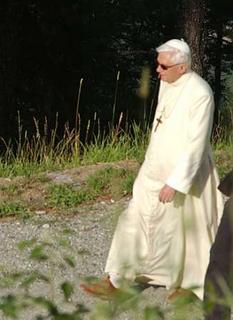
Nicholas Cabasilas: the wound of the beauty of the Spouse
"In the 14th century, in the book, "The Life in Christ" by the Byzantine theologian, Nicholas Cabasilas, we rediscover Plato's experience in which the ultimate object of nostalgia, transformed by the new Christian experience, continues to be nameless. Cabasilas says: "When men have a longing so great that it surpasses human nature and eagerly desire and are able to accomplish things beyond human thought, it is the Bridegroom who has smitten them with this longing. It is he who has sent a ray of his beauty into their eyes. The greatness of the wound already shows the arrow which has struck home, the longing indicates who has inflicted the wound" (cf. The Life in Christ, the Second Book, § 15).
"The beautiful wounds, but this is exactly how it summons man to his final destiny. What Plato said, and, more than 1,500 years later, Cabasilas, has nothing to do with superficial aestheticism and irrationalism or with the flight from clarity and the importance of reason. The beautiful is knowledge certainly, but, in a superior form, since it arouses man to the real greatness of the truth. Here Cabasilas has remained entirely Greek, since he puts knowledge first when he says, "In fact it is knowing that causes love and gives birth to it.... Since this knowledge is sometimes very ample and complete and at other times imperfect, it follows that the love potion has the same effect" (cf. ibid.). He is not content to leave this assertion in general terms. In his characteristically rigorous thought, he distinguishes between two kinds of knowledge: knowledge through instruction which remains, so to speak, "second hand" and does not imply any direct contact with reality itself. The second type of knowledge, on the other hand, is knowledge through personal experience, through a direct relationship with the reality. "Therefore we do not love it to the extent that it is a worthy object of love, and since we have not perceived the very form itself we do not experience its proper effect". True knowledge is being struck by the arrow of Beauty that wounds man, moved by reality, "how it is Christ himself who is present and in an ineffable way disposes and forms the souls of men" (cf. ibid.).
"Being struck and overcome by the beauty of Christ is a more real, more profound knowledge than mere rational deduction. Of course we must not underrate the importance of theological reflection, of exact and precise theological thought; it remains absolutely necessary. But to move from here to disdain or to reject the impact produced by the response of the heart in the encounter with beauty as a true form of knowledge would impoverish us and dry up our faith and our theology. We must rediscover this form of knowledge; it is a pressing need of our time."
No comments:
Post a Comment